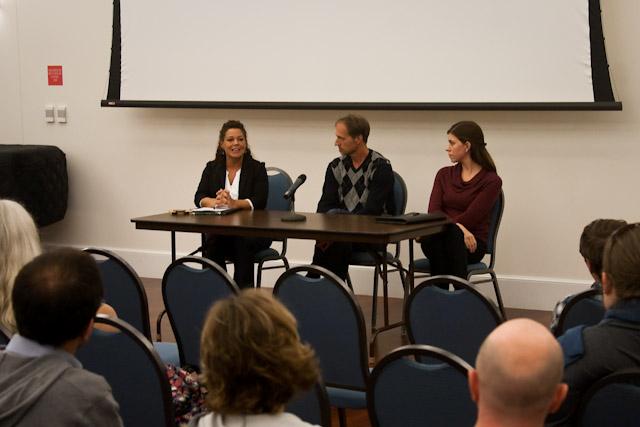
The “Call and Response” documentary screening was followed by a panel Tuesday night in Prothro Hall. (Spencer J Eggers/The Daily Campus)
The opening footage is of small children, no more than five or six, offering “boom boom,” what they call sex, to men coming to buy them. These children are part of human sex trafficking that occurs around the world.
“Call and Response” is a documentary that combines interviews, information and footage of human trafficking with musical performances by artists such as Cold War Kids, Natasha Bedingfield, Imogen Heap and Five for Fighting, to educate people about human trafficking and bring attention to this global problem.
Perkins School of Theology at Southern Methodist University held a screening of “Call and Response” Tuesday night in Prothro Hall. The movie was followed by a panel discussion featuring three local professionals working with human trafficking relief organizations.
Justin Dillion, the director of the film, was first exposed to human trafficking on a trip to Russia when his young female translator told him about an opportunity she was given to move to the United States. The opportunity turned out to be fake and just a ploy to enslave her.
Disgusted and uninformed, Dillion made it his mission to get educated about human trafficking. Being a professional musician, he decided to create a sort-of benefit concert through a documentary. He got various musicians to perform on camera, then when the film gained momentum, he interviewed journalists, politicians, actors and professionals with a background in human trafficking. He also recorded and compiled footage of human trafficking from around the world.
Throughout the film different aspects of human trafficking are discussed and explained. One that stuck out was the sex trade of virgins.
According to the film, virgins are the most valuable commodity in the sex trade, and this is exploited as much as possible. For example, a girl as young as five or six is sold to a man for a week where she will be raped by up to 40 men. Then, her pimp will pay to have her hymen sewed up and she is sold again the next week. The next group of men will see the young girl bleeding and in pain, believing she is losing her virginity for the first time.
“The movie was very necessary, but very heart wrenching,” said Kelly Anderson, an SMU sophomore. “As someone who is interested in children’s ministry, it was hard to see young children being exploited like that, but I think it needs to be seen in order to get things done.
According to the film, drugs, weapons and humans are the three largest trafficking cartels in the world, and human trafficking is the largest and fastest growing of the three.
The movie shows footage of people around the world enslaved in various trades of human trafficking like sex, domestic servitude and manual labor.
“{Mosaic Family Services says] that 80 percent of human trafficking in the world is labor trafficking because it is in the products that we are using. It is all around us,” said Laura DeMoss, panel participant and Human Trafficking Outreach Program Coordinator at Mosaic Family Services. “Domestically, if you look at the numbers, as far as cases go, about 80 percent of the cases that we see are sex trafficking. It is much easier to notice a 16 year old who is engaging in prostitution, than it is a guy who is being forced to sleep on the floor of the dry cleaner where he is working.”
Human trafficking is only growing, but it is happening right here in the United States.
“We need to engage in the conversation about supply and demand. There is a demand for the sex trade. Americans, here, now, are demanding that the sex trade continue,” said Tammy Wagler, panel participant and director of DFW Hope Springs. “When I walk into a room of men arrested for soliciting sex, it blows my mind how equal it is in race, socio-economic and church background.”
If you see or know of someone being trafficked and you want to help, contact a human trafficking hotline.
“Do not engage and try to get them off the street right then and there,” said Wagler “it will do more harm than good for the people being trafficked.”









